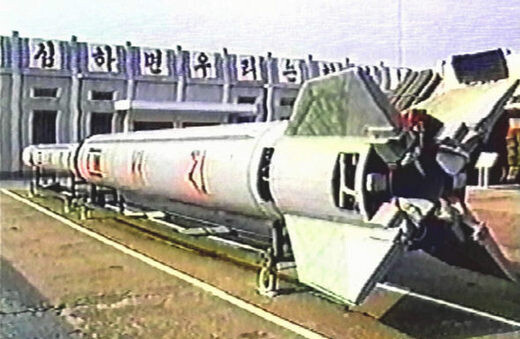hankyoreh
Links to other country sites 다른 나라 사이트 링크
[News Analysis] Washington holds key to North’s missile test

The South Korean government was incredulous when North Korea indicated it would test-fire a long-range ballistic missile early last month. At that time, South-North relations were as smooth as could be, as the 18th round of South-North ministerial talks were held late April. Brief tension arose when the North unilaterally cancelled a test run of cross-border train on May 24, but the two sides recovered the plans with a framework to conduct the test amid a framework of economic cooperation. Moreover, Seoul and Pyongyang jointly held a festival in celebration of the 6th anniversary of the "6.15 South-North Joint Declaration" in Gwangju just this week.
When foreign media including Reuters, quoting U.S. officials, reported that North Korea could possibly conduct a test-fire of its Daepodong-2 missile within a week’s time, Seoul was skeptical. Then, on June 15, a key foreign relations and security official suddenly issued a "missile alarm." According to Kyodo News Agency, the government obtained information that the North had entered the last preparatory stage of a test-fire. However, the missile was not yet fueled up.
Considering that the North has played the "missile card" whenever the communist regime has something serious to demand of international society, this time also the North’s intention is rather clear, expressed through a Foreign Ministry statement on May 1. Pyongyang asked for U.S. chief representative of six-party talks Christopher Hill to visit the North. Pyongyang’s demands follow the logic that, if the U.S. really intends to follow the tenets of the September 19 Joint Statement made in Beijing last year, Secretary Hill should visit Pyongyang and explain his country’s stance firsthand.
According to the North ministry’s statement, "If Washington elevates pressure on us while employing hostile policies against Pyongyang, we will have to take ultra hard-line measures to defend our right to survival and independence." Such a threat was not accepted seriously at that time. However, as a U.S. official mentioned on June 12, the North "has prepared for a missile test-fire since then."
The point of the North’s statement, in fact, was that if Hill’s Pyongyang visit happens, the North will join the six-party talks. In consideration of the fact that the North’s statement did not demand Washington lift its financial sanctions, and the fact that the statement made clear that the six-party talks and the 9.19 joint statement were satisfactory to Pyongyang, the intentions of the North are different from the past. Kyodo News Agency said on June 9 that Chinese President Hu Jintao played the role of mediator to secure Hill’s invitation to the North, but the U.S. denied this.
The North’s discussion of "ultra hard-line measures" in the statement cannot help but bring back to the South the nightmare of Pyongyang’s 1993 declaration to withdraw from the Nuclear Non-Proliferation Treaty. A Seoul official said of the recent missile test preparations, "The North stands to lose more regarding the South-North relationship than in the past." On the issue of inter-Korean relations, there indeed are several complicated matters to be resolved in the near future, such as former president Kim Dae-jung’s planned visit this month to Pyongyang.
The North, however, is in the preparatory stages for the missile test. Thus, the solution is simple. The North should choose between whether it will conduct the missile test-fire or whether it will resume six-party talks, including bilateral negotiations with the U.S. Zhang Wui, the Chinese Foreign Ministry spokeswoman, noted during a regular briefing on June 15, obstacles to resuming the six-party talks should be removed as soon as possible. In the meantime, South Korea and China hinted that the missile test-fire depends on the attitude of the U.S., not the North. Unless Washington accepts this seriously, the situation of Korean Peninsula will be extremely uncertain.
Editorial・opinion
![[Column] Season 2 of special prosecutor probe may be coming to Korea soon [Column] Season 2 of special prosecutor probe may be coming to Korea soon](https://flexible.img.hani.co.kr/flexible/normal/500/300/imgdb/original/2024/0426/3317141030699447.jpg) [Column] Season 2 of special prosecutor probe may be coming to Korea soon
[Column] Season 2 of special prosecutor probe may be coming to Korea soon![[Column] Park Geun-hye déjà vu in Yoon Suk-yeol [Column] Park Geun-hye déjà vu in Yoon Suk-yeol](https://flexible.img.hani.co.kr/flexible/normal/500/300/imgdb/original/2024/0424/651713945113788.jpg) [Column] Park Geun-hye déjà vu in Yoon Suk-yeol
[Column] Park Geun-hye déjà vu in Yoon Suk-yeol- [Editorial] New weight of N. Korea’s nuclear threats makes dialogue all the more urgent
- [Guest essay] The real reason Korea’s new right wants to dub Rhee a founding father
- [Column] ‘Choson’: Is it time we start referring to N. Korea in its own terms?
- [Editorial] Japan’s rewriting of history with Korea has gone too far
- [Column] The president’s questionable capacity for dialogue
- [Column] Are chaebol firms just pizza pies for families to divvy up as they please?
- [Column] Has Korea, too, crossed the Rubicon on China?
- [Correspondent’s column] In Japan’s alliance with US, echoes of its past alliances with UK
Most viewed articles
- 1AI is catching up with humans at a ‘shocking’ rate
- 2After election rout, Yoon’s left with 3 choices for dealing with the opposition
- 3Is Japan about to snatch control of Line messenger from Korea’s Naver?
- 4South Korea officially an aged society just 17 years after becoming aging society
- 51 in 5 unwed Korean women want child-free life, study shows
- 6[Column] ‘Choson’: Is it time we start referring to N. Korea in its own terms?
- 7Korea’s 1.3% growth in Q1 signals ‘textbook’ return to growth, says government
- 8No good, very bad game for Korea puts it out of Olympics for first time since 1988
- 9[Editorial] Japan’s rewriting of history with Korea has gone too far
- 10Why Korea shouldn’t welcome Japan’s newly beefed up defense cooperation with US